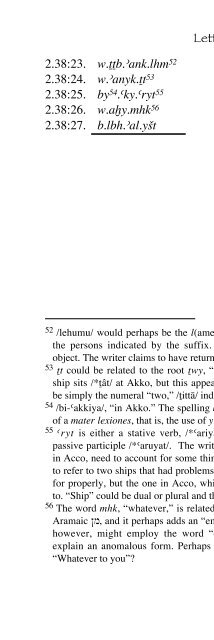A Primer on Ugaritic: Language, Culture, and Literature - enenuru
A Primer on Ugaritic: Language, Culture, and Literature - enenuru
A Primer on Ugaritic: Language, Culture, and Literature - enenuru
You also want an ePaper? Increase the reach of your titles
YUMPU automatically turns print PDFs into web optimized ePapers that Google loves.
2.38:23. w.ttb.}ank.lhm 52<br />
2.38:24. w.}anyk.tt 53<br />
2.38:25. by 54 .{ky.{ryt 55<br />
2.38:26. w.ah˙y.mhk 56<br />
2.38:27. b.lbh.}al.ysût<br />
Letters 89<br />
52 /lehumu/ would perhaps be the l(amed) of advantage, indicating a benefit for<br />
the pers<strong>on</strong>s indicated by the suffix. It seems here to indicate the indirect<br />
object. The writer claims to have returned all their stuff (line 21) to them.<br />
53 tt could be related to the root twy, “to dwell,” known from Arabic, thus the<br />
ship sits /*ta®t/ at Akko, but this appeal to Arabic seems unnecessary. tt could<br />
be simply the numeral “two,” /tittaœ/ indicating a sec<strong>on</strong>d ship.<br />
54 /bi-{akkiya/, “in Akko.” The spelling by is perhaps another example of the use<br />
of a mater lexi<strong>on</strong>es, that is, the use of y as a vowel letter.<br />
55 {ryt is either a stative verb, /*{ariyat/, or an adjective, /*{ariyati/, or a G<br />
passive participle /*{aruyat/. The writer asserts, “We did fine, but those folks<br />
in Acco, need to account for some things.” If two ships, then lines 10–11 need<br />
to refer to two ships that had problems. One ended up in Tyre <strong>and</strong> is accounted<br />
for properly, but the <strong>on</strong>e in Acco, which he knows less about, is <strong>on</strong>ly alluded<br />
to. “Ship” could be dual or plural <strong>and</strong> the relative dt could be /duœtu/.<br />
56 The word mhk, “whatever,” is related to Hebrew hm, Akkadian mannam, <strong>and</strong><br />
Aramaic Nm, <strong>and</strong> it perhaps adds an “emphatic” k. This explanati<strong>on</strong> of the form,<br />
however, might employ the word “emphatic” too loosely <strong>and</strong> quickly to<br />
explain an anomalous form. Perhaps the k is a 2s suffix, denoting, literally,<br />
“Whatever to you”?


